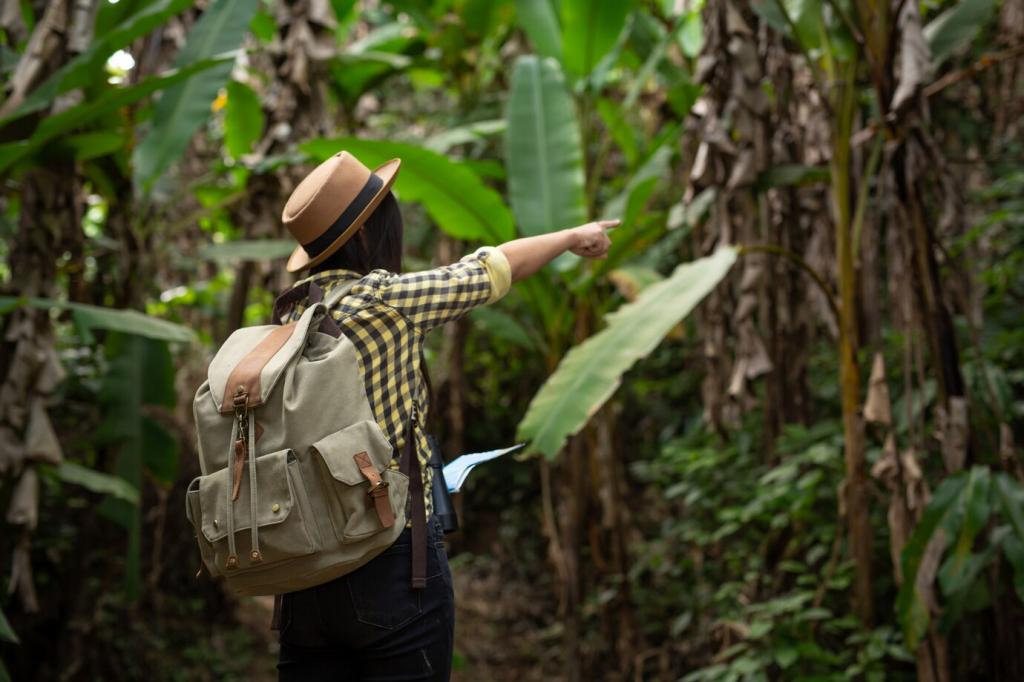Travel Light on the Planet: Tips for Reducing Carbon Footprint While Traveling
Chosen theme: Tips for Reducing Carbon Footprint While Traveling. Explore practical, joyful ways to shrink emissions without shrinking your sense of adventure. Dive into stories, science-backed habits, and traveler-tested shortcuts. Share your favorite low-carbon travel tip in the comments and subscribe for weekly inspiration.

Plan Smarter, Emit Less
Trains and intercity coaches typically produce a fraction of flight emissions per passenger-kilometer, all while offering roomy seats and scenic views. Reader Maya swapped London–Paris flights for rail and arrived rested, croissant in hand, proud of her lighter footprint.

Pack for Low-Carbon Journeys
Go ultralight to cut fuel use and add freedom
Every kilogram matters, especially in the air and on buses. A smaller bag makes walking or cycling between stations easy, reduces rideshare dependence, and encourages minimalist, more mindful travel choices.
Reusable kit: bottle, cup, cutlery, tote
Carry a refillable bottle, compact coffee cup, lightweight cutlery, and a foldable tote. You will skip single-use plastics, save money, and stay hydrated via refill stations you can find with local apps and maps.
Efficient tech and charging habits
Choose low-watt chargers, a high-quality power bank, and enable battery saver and airplane mode when offline. Charge during off-peak hotel hours when possible, and unplug devices once full to avoid energy waste.
Sleep and Stay Sustainably
Choose certified accommodations
Look for respected labels like Green Key, EU Ecolabel, or LEED. These properties typically track energy, water, and waste, invest in efficiency, and train staff, making your stay measurably lower impact.
Practice low-impact room habits
Decline daily linen changes, take shorter showers, set the thermostat a few degrees warmer or cooler, and switch off lights and electronics. These simple routines add up, especially in energy-intensive hotels.
Support local, community-rooted stays
Guesthouses, cooperatives, and family-run inns often source locally and operate on leaner footprints. Your money circulates nearby, strengthening resilient neighborhoods and shortening supply chains that move goods fewer kilometers.

Eat and Sip with the Climate in Mind
Plant-forward plates on the road
Opt for vegetable-forward dishes most days and treat high-emission meats as occasional indulgences. Local beans, grains, and seasonal produce anchor vibrant meals that reflect a place without heavy climate costs.
Local and seasonal first
Farmers’ markets and neighborhood eateries often feature regional, in-season ingredients with fewer transport emissions. Ask staff what is fresh this week, and let the menu guide you toward lower-impact, memorable flavors.
Waste less, enjoy more
Order modest portions, share plates, and carry a collapsible container for leftovers where culturally appropriate. Planning snacks reduces impulse buys and packaging, saving both carbon and cash throughout your journey.
Move Like a Local
Bring comfortable shoes or rent bikes and e-bikes. You will discover street-level stories, support small businesses, and replace short, high-emission car rides with movement that feels good in every sense.
Move Like a Local
Download transit apps, buy day passes, and learn off-peak windows. Subways, trams, and buses are efficient, affordable, and often faster than taxis. Share your favorite transit hack in the comments to help others.
Move Like a Local
If you need a car, choose rideshares with pooled options or electric vehicles when available. Combine errands into a single trip, and request idle-off to limit unnecessary fuel burn during waits.

Choose high-quality carbon projects
If you offset, look for independent verification like Gold Standard or Verified Carbon Standard. Favor projects with clear additionality, transparent reporting, strong safeguards, and benefits for local communities and ecosystems.

Give back where you roam
Donate to local conservation, reforestation, or resilience projects, and join short volunteer activities that fit your skills. Ask hosts which initiatives matter most and align with the region’s environmental priorities.
